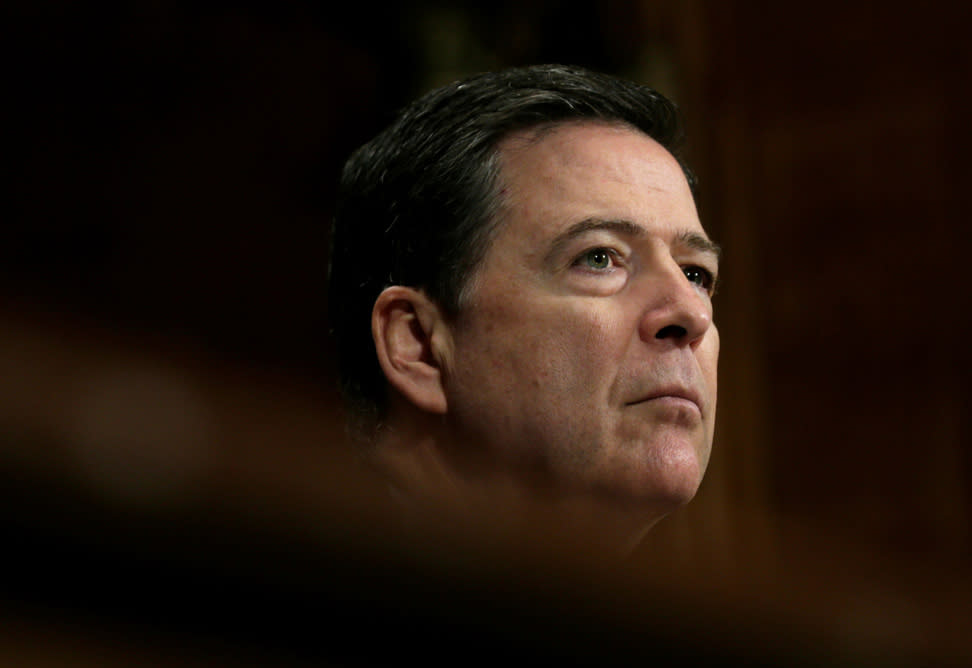James Comey 'knew key Clinton intelligence was fake' and acted on it anyway

A central piece of intelligence in the FBI’s investigation of Hillary Clinton’s private email server was fake – and FBI Director James Comey acted on it anyway, CNN reports.
The Washington Post reported last week that the FBI had obtained intelligence alleging then-Attorney General Loretta Lynch had conspired with former Democratic National Committee Chair Debbie Wasserman Schultz to limit the FBI’s investigation into Ms Clinton.
That piece of intelligence helped convince Mr Comey to announce his department's findings independently of the attorney general – an untraditional move that generated outcry on the left and the right.
Now, sources tell CNN that Mr Comey knew the document was likely fake, but acted on it anyway.
The FBI director feared that the document – real or not – would shake the public’s confidence in Ms Lynch if it was leaked. Ms Lynch was already under intense scrutiny for speaking with former President Bill Clinton on his private plane before the investigation’s conclusion.
Shortly before starting his now-infamous press conference, Mr Comey told FBI employees he was acting alone “because I think the confidence of the American people in the FBI is a precious thing, and I want them to understand that we did this investigation in a competent, honest, and independent way”.
Later, Mr Comey cited the intelligence on Ms Lynch and Ms Wasserman Schultz as a major reason he acted alone. In at least one classified session, sources tell CNN Mr Comey called it a the “primary reason” he took the unusual step.
In fact, the intelligence garnered so much interest that Senator Charles Grassley asked about it during Mr Comey’s final public appearance before Congress as FBI Director.
In none of these situations did Mr Comey let on that he knew – or even suspected – that the document was fake.
James Comey may have been influenced during the Hillary Clinton email investigation by a phony Russian clue https://t.co/yFi8lYNUxZ pic.twitter.com/wWjWfIJAAw
— CBS News (@CBSNews) May 25, 2017
Still, sources tell both CNN and The Washington Post that the FBI had long doubted the veracity of the intelligence, and even suspected it had been created by Russian officials to dupe the US.
To being with, the source of the information had previously provided the FBI with unproven information.
The FBI was also unable to obtain the primary document mentioned the intelligence: an email allegedly written by Ms Wasserman Schultz to Leonard Benardo, an official with the Open Society Foundations. The email allegedly discussed conversations between Ms Lynch and Clinton campaign staffer Amanda Renteria.
We must continue to seek the truth, our democracy depends on it. @washingtonpost https://t.co/0CahqmcB3W
— Amanda Renteria (@AmandaRenteria) May 25, 2017
According to the intelligence, Ms Wasserman Schultz recounted conversations to Ms Renteria in which Ms Lynch promised not to push too hard on the Clinton investigation.
According to Ms Wasserman Schultz and Ms Renteria, however, the two have never spoken to one another. Ms Lynch also denied any knowledge of the email when asked about it by the FBI. The bureau declined to formally interview her.
Ms Wasserman Schultz, Mr Benardo and Ms Renteria all told The Washington Post they had never been interviewed by the FBI about the matter.
“Wow, that’s kind of weird and out of left field,’’ Ms Renteria said when contacted by the Post. “I don’t know Loretta Lynch, the attorney general. I haven’t spoken to her.’’
Still, Mr Comey told members of Congress in classified briefings that his fears of the intelligence could "dropping" and undermining the Clinton investigation were a key motivator of his actions,.
The White House has cited Mr Comey’s handling of the Clinton investigation as the reason Mr Trump fired him, although the President himself has provided several contradictory explanations. Ms Clinton has blamed Mr Comey’s actions for her election loss.

 Yahoo News
Yahoo News 
